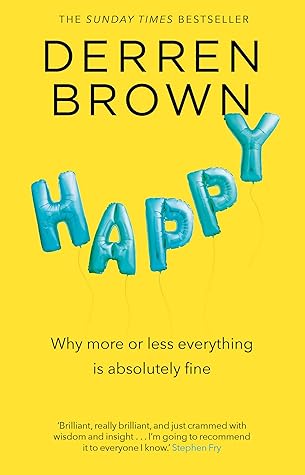More on this book
Community
Kindle Notes & Highlights
In the centred life, work, health, family and friends may still make their demands, but we can acknowledge and entertain those forces without feeling them impose directly upon our core selves. We are missing out if we feel that happiness is a result of lucky circumstance rather than something rooted immovably in us. For it to be solid, our happiness would not rely on fortuity or what we happen to have. It would be fundamentally about who we are.
This is not a childish cry out to an indifferent universe or an infantile drive to have every shallow wish fulfilled. It is instead the sincere desire to rid oneself of illusion, to live authentically, and through that to find how we might flourish most happily.
Is your centre of gravity within you, with your self-image sturdy and tenacious, or is it outside of you and woefully subject to the inconstancies of fate and the intimations of others? And when you reach the end of this life, will you feel you have lived a life worth living?
‘Everything we need is easy to procure, while the things we desire but don’t need are more difficult to obtain.’
‘The smart way to keep people passive and obedient is to strictly limit the spectrum of acceptable opinion, but allow very lively debate within that spectrum.’
The Stoics even said that a Stoic sage (a semi-fictional role model for the seeker of virtue) would still, while being tortured on the rack, be able to smile and think ‘This is happening to my body, but it isn’t happening to me.’ We may find this too far-fetched, as did many of the Stoics’ contemporaries, but the reality is that for the person being tortured or abused, the kind of detachment that the Stoic message encourages might be the only comfort remaining. The message is not ‘blame yourself’ but to realise that whatever happens to you, it does not need to affect you, your core self,
...more
I am responsible for how I feel about external events. What am I doing to give myself this feeling? Is this thing that’s upsetting me something which lies under my control? If not, what if I were to decide it’s fine and let it go?
We can benefit from remembering the words of the novelist David Foster Wallace: ‘You will become way less concerned with what other people think of you when you realise how seldom they do.’
A regular period of quiet solitude helps create a bedrock of self-sufficiency that accompanies us into the social hours ahead. As the addictive pleasures and miseries of electronic communication and phone-browsing offer themselves to us every minute of the day and night, we forget the benefits of time spent calmly with and within ourselves. If we are able to find time and space each day to redress the balance, and if we use it to remind ourselves that so much of our life has nothing to do with us, and that it is only with our thoughts and actions that we need to concern ourselves, we will soon
...more
Anybody can become angry – that is easy, but to be angry with the right person and to the right degree and at the right time and for the right purpose, and in the right way – that is not within everybody’s power and is not easy.
the key vision of Stoicism is the enhancement of an ‘ordinary’ life to connect more powerfully to one’s fellow human beings and to move more in accord with the universe.
When we are happy, we have won the game, and the fact is self-evident; there’s no need to broadcast the victory.
As I have written elsewhere, the heart of true self-improvement surely lies in becoming kinder (from a place of strength).
Swaggering self-entitlement is chilling to behold and comes from an inflated level of expectation as to the extent to which others are likely to arrange every matter to one’s complete satisfaction. The problem is that as we become successful, more and more people do begin to fuss around us, and embarrassed as we might be the first or second time this happens, we soon find ourselves making requests we would previously have never imagined could come from our lips. It is easy to grow accustomed to little luxuries and then soon generalise the experience and expect it elsewhere, at the restaurant
...more
Do not seek to have events happen to you as you want them to, but instead want them to happen as they do happen, and your life will go well.
We can aim high, seek to change the world, yet always be satisfied with the outcome.
No longer mistaking our judgements about events for the events themselves; being open to the complex narratives that lead to the imperfect behaviours of others; deflating our exalted sense of self to a more modest measure; letting our experience of others decide what’s realistic to expect.
A considered life should not, like the pious one, be a matter of subjugation to any label, under which all the ‘consideration’ has been previously done for you.
The famed philosopher Immanuel Kant gave this language in the eighteenth century: he said we perceive the phenomenal world, with its various familiar phenomena such as tables, and that there is also the other level that we know must be there but can’t experience: the noumenal world. ‘Noumenal’ comes from ‘nous’, in the sense of intuition; it describes the world we can intuit but not perceive – what lies beyond the reach of our senses. We can also talk of ‘things-in-themselves’ occupying this realm, rather than the ordinary ‘things’ that exist in our perceptions every day.


